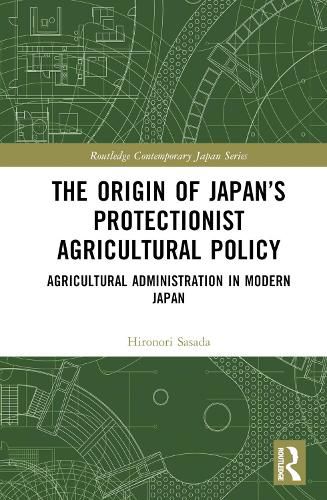Readings Newsletter
Become a Readings Member to make your shopping experience even easier.
Sign in or sign up for free!
You’re not far away from qualifying for FREE standard shipping within Australia
You’ve qualified for FREE standard shipping within Australia
The cart is loading…






This book explores the origins of Japan's protectionist agricultural policies through an in-depth historical analysis of Japanese agricultural policies between the Meiji period and the end of WWII.
It offers a constructivist account for the rise of protectionism, examining the policies of prewar agricultural bureaucrats who played critical roles in the policymaking process. It argues that protectionist agricultural policy in Japan was not originally generated by the "iron triangle" (a political alliance consisted of the Liberal Democratic Party, the Agricultural Ministry, and farmers' organizations) but by a prewar agricultural bureaucrats' policy idea called shono ron (thoughts on small-scale farming). Ultimately the book reveals how, contrary to suggestions of previous scholarship, the protective measures based on shono ron forged the necessary conditions for the emergence of "iron triangle" after the end of WWII, which in turn institutionalized Japan's subsequent protectionist agricultural regime.
Examining such topics as the origin of protectionist policy, the formation of actors' preferences, and the broader effects of agricultural policy ideas, this book will be a valuable reading for scholars and students of Japanese politics, agricultural policy, and political economy.
$9.00 standard shipping within Australia
FREE standard shipping within Australia for orders over $100.00
Express & International shipping calculated at checkout
This book explores the origins of Japan's protectionist agricultural policies through an in-depth historical analysis of Japanese agricultural policies between the Meiji period and the end of WWII.
It offers a constructivist account for the rise of protectionism, examining the policies of prewar agricultural bureaucrats who played critical roles in the policymaking process. It argues that protectionist agricultural policy in Japan was not originally generated by the "iron triangle" (a political alliance consisted of the Liberal Democratic Party, the Agricultural Ministry, and farmers' organizations) but by a prewar agricultural bureaucrats' policy idea called shono ron (thoughts on small-scale farming). Ultimately the book reveals how, contrary to suggestions of previous scholarship, the protective measures based on shono ron forged the necessary conditions for the emergence of "iron triangle" after the end of WWII, which in turn institutionalized Japan's subsequent protectionist agricultural regime.
Examining such topics as the origin of protectionist policy, the formation of actors' preferences, and the broader effects of agricultural policy ideas, this book will be a valuable reading for scholars and students of Japanese politics, agricultural policy, and political economy.